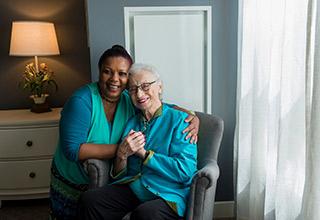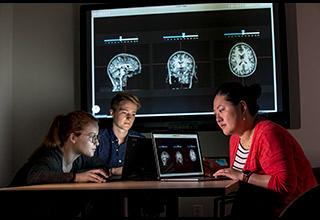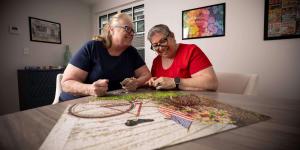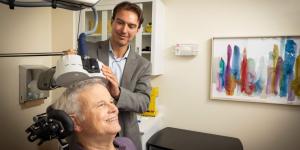Using a Functional Assessment to Test for Cognitive Decline
What mobility, eyesight, depression, grip strength, and other measurements can tell us about your cognitive health.

When we think of cognitive decline and dementia many people tend to focus on a few measures of brain health. The reality is a lot more complicated.
In fact, there are many systems in our bodies that impact brain function, and the brain controls much more than just our cognition and speech. That’s why complex conditions like dementia can be affected by a variety of physical, social, and lifestyle risk factors; and why diseases like Alzheimer’s affect a person’s entire body, not just their brains.
A neurologist is often the first step for older people who are concerned about memory loss. While this is an important part of a comprehensive memory assessment, at Hebrew SeniorLife’s Deanna and Sidney Wolk Center for Memory Health we believe that evaluating someone’s brain by way of cognitive assessments and neuroimaging is just the tip of the iceberg.
Assessing a patient’s physical, social, and emotional health provides a much more complete picture of the person’s overall level of functioning.
Not only does this provide a better diagnosis, it helps to maximize a patient’s quality of life. Identifying big picture interventions based on areas of opportunity can impact the course of a person's disease, and delay or prevent mild cognitive impairment from turning into dementia.
The whole-person approach
At the Wolk Center for Memory Health, we created a unique tool for identifying those weaknesses: a functional assessment. It’s one of the first steps we take when a patient comes to us for help. The functional assessment involves the collection and analysis of health-related data that is then used by our care team to support healthy behaviors and encourage changes to behaviors that have been associated with an increased risk of cognitive decline.
Early intervention is important so patients can still take action to minimize or start to reverse any negative health consequences. We support these efforts in a number of ways, such as visits with a social worker or psychologist at the Wolk Center, a physical or occupational therapist at Hebrew Rehabilitation Center, or connections to community resources.
Another thing the functional assessment can tease out is whether any other conditions could be causing cognitive impairment that is unrelated to dementia, like medication side effects, depression, and certain other diseases. In many cases, these conditions can be addressed and cognitive function restored. Additionally, the functional assessment contributes to our clinical team’s ability to make a differential diagnosis, as Alzheimer’s disease is only one of numerous neurodegenerative diseases that can cause cognitive decline.
What Does a Functional Assessment Look At?
The functional assessment starts with a series of standard health indicators. We take vital signs, measure body mass index, and collect the patient’s medical history.
During a functional assessment, I also spend a lot of time asking the patient and any present family members questions about the areas in which they feel they need assistance or are concerned. We collect their health-related data through a series of screenings, tests, and questionnaires. We then analyze that data to identify areas needing improvement.
Sensory Input
One of the most important aspects of brain health is providing stimulation. Sensory input, especially from our ears and eyes, is the basis for how we experience the world. It also stimulates our mind, which is an essential part of combating cognitive decline.
Hearing problems can trigger changes in the brain which may accelerate cognitive decline. Furthermore, vision loss has been linked to the onset of dementia.
A comprehensive eye and ear exam can help diagnose problems at their earliest stages. If our assessment shows any areas of concern, we can connect patients to audiologists for hearing aids, or ophthalmologists for the correct prescription for eyeglasses.
Physical Wellness
Our physical health and activity levels have a lot to do with the health of our brains, especially as we get older. The more we can stay active, the more we can go places and experience things--meaning our brains experience more stimulation.
Muscle Strength
Muscle strength relates to one’s ability to lift or move objects and is defined by the amount of force your muscles can produce when engaging in maximum effort. During a functional assessment, we measure grip to get an idea of a patient’s upper body strength and gauge overall strength.
There is evidence that poor handgrip strength could predict a 10-year cognitive decline. In fact, researchers at Hebrew SeniorLife’s Hinda and Arthur Marcus Institute for Aging Research have been studying the connection between grip strength and a number of health outcomes.
Mobility
We collect a patient’s walking speed and walking steadiness (collectively referred to as gait), as well as standing balance. There is a deep connection between gait and overall health.
Many daily activities require the ability to stand or walk while completing additional tasks like reading signs, carrying food, or holding conversations. There is now considerable evidence that standing and walking in complex situations is dependent not only upon your muscles and bones, but also upon many aspects of cognition and brain function. Improving balance and mobility by targeting cognitive function is another area of research at the Marcus Institute.
Exercise
What’s good for the body is good for the mind. Movement and exercise are correlated with improved brain health and positive cognitive outcomes. The medical director of the Wolk Center for Memory Health, Dr. Alvaro Pascual-Leone, encourages patients to exercise as a way to improve neuroplasticity and increase overall brain health. Even a simple activity like going for a walk each day can lead to significant improvements in your well-being. And it’s never too late to start a new habit, no matter our age!
Pain
If a patient is in pain that will understandably have a negative effect on their health and cognitive performance. Chronic pain contributes to poor memory, difficulty concentrating, and slower processing. Not to mention the potential for mobility issues. If a patient reports chronic pain, we recommend speaking with a clinician to determine how best to alleviate symptoms or treat the underlying cause so that it is not negatively impacting cognitive functioning.
Cognitive Assessment
Cognition is gauged by assessing mental processes such as learning, memory, executive function, language, attention, and abstraction. One cognitive assessment commonly used at the Wolk Center is known as the Montreal Cognitive Assessment (MOCA). It includes a series of tasks related to different cognitive functions and is sensitive to capturing decline in the early stages of cognitive impairment.
Reading, taking a class, learning a new skill, or even playing cognitively stimulating games are all ways that you can increase and maintain brain matter and help prevent decline.
Emotional Well-Being and Social Support
Brain health is closely connected to emotional health. Concerns like depression, stress, and isolation can also impact your physical health and disrupt your quality of life. We ask questions about a patient’s mental health and the support networks they have around them. The answers to these questions help us pinpoint areas that we can focus on to improve quality of life.
Depression Screening
Depression is a risk factor for dementia as people with more symptoms of depression tend to suffer a more rapid decline in thinking and memory skills.
About 18% of adults age 65 and older are affected by depression. Depression is a treatable medical condition that should never be considered a part of normal aging. While treatment may be more complicated as we get older, relief from the symptoms is possible.
Depression can also mimic cognitive decline in older people, so treating the symptoms of depression can in itself improve cognitive functioning.
Stress
Higher levels of stress can lead to deterioration of important areas in the brain responsible for learning and memory. Therefore, it is important to find healthy ways to manage the day-to-day stress of one's life. Some techniques to reduce stress include meditation, listening to guided relaxation, or taking a tai chi or yoga class.
Social Relationships
Increased social ties are linked to improved cognitive health over time. Alternatively, lower levels of social participation, less frequent social contact, and higher levels of loneliness are correlated with dementia. Living in a senior community could be a good solution for some people who feel isolated.
Spiritual Life
Spirituality often helps many individuals to recover from illness should it arise and to maintain their overall health. Some studies have shown that spirituality appears to slow cognitive decline. Additionally, spirituality (e.g. engaging in meditation, prayer, attending communal services) develops healthy coping styles in response to adversity, improving long-term health.
Sense of Purpose
Living with a sense of purpose has been shown to protect against cognitive decline in older adults. Purpose in life is defined as having goals, a sense of direction, and intentions that derive meaning from life experiences. A greater sense of purpose allows individuals to make meaning out of challenges that arise and maintain a healthy perspective.
Lifestyle Assessment
Cognitive health is highly intertwined with the lifestyle choices we make on a day-to-day basis. In fact, scientists estimate that at least 40% of the risk of developing dementia can be altered with attention to our lifestyles. The lifestyle assessment gathers detailed information to help decide what care is needed and identify actionable steps to improve cognitive health and overall well-being.
Medication
A 2013 study found that people ages 50-64 take an average of 19 prescriptions, increasing to 29 for those 80 and older. Reviewing a list of medications allows us to see if there are any negative interactions. We also want to make sure that side effects of the medication don’t outweigh the benefits.
We can work with the patient’s primary care team to remove those that are unnecessary or known to be harmful to older adults. One example is benzodiazepines, which are sometimes prescribed to help with sleep but can cause confusion and an increased risk of falls.
Sleep
We all know how important sleep is for brain and overall health. Ideally, eight hours of sleep on a nightly basis should be maintained so that the body has enough time to rest, remove excess toxins, and be in the best shape possible the next day. Addressing any issues with getting enough rest can have positive repercussions on a patient’s health in general, but especially an older person’s cognitive health.
Nutrition
Including at least two servings of fruits and vegetables each day is helpful in meeting the requirements of a healthy, plant-based diet—which has been shown to lower the risk for dementia. Additionally, reducing processed and red meat while drinking enough water and eating a diet rich in healthy omega-3 fats (such as those found in salmon and olive oil) have proven beneficial for the health of one’s brain. Another benefit to a plant-based diet is that it can help with weight loss, as obesity is a risk factor for dementia. For people who struggle with nutrition, we might recommend meeting with a Registered Dietitian as part of the outpatient nutrition therapy program at Hebrew Rehabilitation Center.
Alcohol or smoking
For the best cognitive health outcomes, alcohol should be limited to no more than one drink (preferably red wine) per day. While the research literature is still debating what amount of alcohol is best, it is known that too much alcohol can have negative effects. Limiting or quitting smoking altogether is vitally important for the cardiovascular health required to maintain a healthy brain.
Frailty Index
Frailty is a medical term that describes a state of health that is at risk for deterioration. The frailty index—developed by the Marcus Institute—helps us identify vulnerable areas of health including mobility, muscle strength, cognition, and nutrition. It also looks at whether a patient can take care of their own basic needs such as bathing and feeding as well as more complicated chores required for living independently, such as managing money and grocery shopping.
The functional assessment gathers data on these areas so that we can compare each patient’s scores with national averages. We also look at a broad history of diagnosed health conditions over the course of an individual’s life. Knowing frailty status is helpful in managing medical conditions that may contribute or even worsen existing frailty and help the clinical team determine which interventions will lead to the best possible outcomes over the long term.
One-of-a-Kind Treatment Plans for Dementia
Rather than focusing on a limited view of a patient’s brain health, the Wolk Center for Memory Health’s care emphasizes the entire person. This unique approach is much more effective at providing better health outcomes as there are many different factors that impact our brains.
Whenever a patient comes to see us, the functional assessment is an important first step. By quickly assessing multiple domains of health such as mobility, cognition, mood, nutrition, and lifestyle we can establish a data-driven, evidence-based baseline to compare progress against so that we can provide each patient with the best care possible.
With the appropriate guidance and treatments, we can prevent frailty and promote healthy aging, including reducing the risk of dementia. The Wolk Center aims to provide the support patients and their families need to establish and realize their own personal goals for wellness and quality of life.
To learn more about the Wolk Center for Memory Health and how we can help, call us at 617-363-8600 or contact us online.
Blog Topics
Learn More
Free Guide to Brain Health
Download our free guide, “Optimizing Your Brain Health,” for expert advice on boosting brain health at any age. Explore practical tips and resources from Hebrew SeniorLife’s Deanna and Sidney Wolk Center for Memory Health.

Wolk Center for Memory Health
The Deanna and Sidney Wolk Center for Memory Health at Hebrew SeniorLife provides outpatient memory care services, in person and virtually, for people living with cognitive symptoms — and for their families and caregivers.

Research on Aging
At the Hinda and Arthur Marcus Institute for Aging Research, Harvard Medical School-affiliated researchers are working to uncover answers to some of the most pressing challenges of aging.





